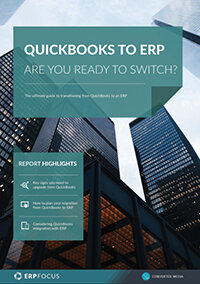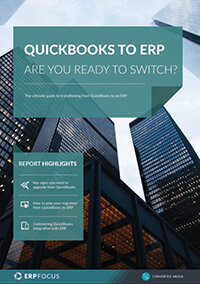Why companies upgrade from QuickBooks to ERP
Jones & Company is like millions of small businesses around the world. Dan Jones started selling gadgets out of his garage 15 years ago. Over the years he supported his family and he and his wife and kids have a nice house in a nice neighborhood. Dan checks his QuickBooks from time to time.
But he knows if his business is on track when there is money in the bank, the employees are paid and none of the supplier or utility bills are overdue. 'Keep things simple' has been Dan’s motto. So why would Dan, Jones & Company, or another small business ever want to move from QuickBooks to an ERP system?
The ERP will cost money and he will need to hire one or more people just to manage ERP. People who are not selling or assembling or any other work directly related to meeting customer requests.
It comes down to money
Whether the money is dollars, euros, or pesos, if there comes a time when more is needed and working out from where that money will come, an ERP might be the answer.
New products
A large retail chain shows significant interest in selling one of your products. For Jones & Company, this could be too much of a good thing. Selling at a much higher rate means increasing the production staff and purchasing equipment for them. It probably will also require a larger facility.
Jones will need to acquire and hold much more inventory than ever, which will require a lot of cash. The retailer also keeps a right to return unsold merchandise for any reason so there is a new risk factor to consider. Previous sales volume has been a few million dollars a year and taking this new business could require $25 million in a short time.
Improve sales profitability
The original products still sell pretty well but both volume and margin are dropping. Jones could redesign the products to reduce the cost. Jones also considered taking on some new products that are more current. Either option forces Jones to invest in engineering development costs that might never be recovered. If Jones accepts that risk, there will be other costs involved to ramp up business. Where will the money come from?
Business succession
Dan, Jr., Dan’s son, is in line to take over Dad’s business in the future. Junior is a college graduate from a good business school. He has his own ideas for the business and wants to expand from the comfortable level Dan was always satisfied with.
Finance requirements
Money for any of these needs could come from a bank loan. Venture capital providers and angels are other sources of expansion cash. Businesses can raise significant cash through an initial public offering. There are advantages and disadvantages related to any option.
One certainty though is that whoever provides the cash will want to know how the money is used and when and how it will be paid back. They will want an accounting system that meets a high level of compliance with accepted accounting practices and allows for advanced reporting as needed to make future decisions.
QuickBooks, even with some of the available third-party enhancements might not be the best system. The financier might demand a specific ERP or simply request Jones & Company to choose one of their own. Money is a very likely reason for any business to decide to use an ERP and leave QuickBooks behind.
Free white paper

Quickbooks to ERP: Are You Ready to Switch?
Get the definitive guide to converting your business from Quickbooks to ERP

Featured white papers
-

Quickbooks to ERP: Are You Ready to Switch?
Get the definitive guide to converting your business from Quickbooks to ERP
Download
Related articles
-

QuickBooks vs ERP: What ERP does better
Could your accounting & inventory management benefit from upgrading to ERP?
-

Secret KPI: Why Your ERP Implementation Team Matters More Than Software
Learn how Godlan ensures successful ERP implementation for manufacturers with proven strategies &...
-

Why small businesses upgrade from QuickBooks to ERP
Find out why some companies choose to upgrade from QuickBooks to ERP software

